/Long%20Lasting%20Dog%20Chews%20to%20Keep%20Your%20Dog%20Busy/best-long-lasting-chews.webp)
Chewing. Every dog’s favourite pastime. For some dogs, anything that fits in their mouth is considered food, but that doesn’t make it safe or healthy. Finding the best chew for dogs can offer a number of benefits to their health and well-being.
Many dogs are avid chewers, and finding a chew that will keep your dog busy for a long time and that he will love is almost impossible. And with so many options to choose from, it can be tricky.
Different types of chews all serve important purposes: helping with dental health, keeping your dog busy chewing, supplying natural minerals for bone and joint health, and more.
Keep in mind that all chews could potentially be a choking or obstruction hazard, and pets should always be monitored while enjoying them.
Using natural, safe, and long-lasting dog chews to improve your pet’s health is easier than you might think. Learn which natural chews are appropriate for different dietary needs and life stages, and how long-lasting dog chew sticks can prevent destructive behaviours.
What is a Natural Dog Chew?
Dogs need to chew, and offering them a natural and safe alternative to some of the more dangerous objects they choose to nibble on is highly recommended. Natural chews are typically animal in origin and almost always edible.
Many animal parts can be dehydrated, dried, or cooked, but a natural chew needs to be large or durable enough to retain your dog's chewing for a while.
Instead of small, chewy, or soft dog treats like beef liver or dehydrated sweet potato, natural chews are made from tougher ingredients like bone, tendon, or cartilage to provide a longer-lasting and more formidable chewing experience.
Natural chews can range in durability, with some better suited for smaller breeds, while some of the toughest natural chews may stand up to a powerful, large breed dog for 30 minutes or even longer.
Your dog has unique needs and preferences, and you’ll need to figure out which chews will be right for your pet.
5 Health Benefits of Long Lasting Dog Chews
.webp?width=800&height=556&name=best-dog-chews-article-feature%20(1).webp)
Finding the best chew for dogs depends on what you are trying to accomplish. If your goal is just to treat Fido, then most chews for dogs will work fine.
However, your dog's chews may also be benefiting your dog’s health in ways you didn’t even realize. Let’s go through the main benefits of natural chews for dogs:
1. Chewing is Good for Dental Health
Your dog’s natural desire to chew comes from its ancestors. Chewing is how wild dogs and wolves care for their teeth. Gnawing on bones, tendons, and raw meat helped to maintain their dental health.
For domesticated pets, diet, environment, and lifestyle all contribute to greater dental care needs. While hours of chewing have many dental benefits, caring for your dog's teeth is a bit more complicated, and they require a more human tooth care approach: Toothbrushing.
For more information about your pet's dental health needs, hop over to our Step-by-Step Guide to Brushing Your Dog's Teeth.
Although your pup’s teeth can't be cared for by chewing alone, offering safe, natural chewing is an excellent complement to their existing dental routine.
Different types of natural chews will provide different levels of dental care, so it’s a good idea to offer your dog a rotating variety of natural chews each week. This can also keep the chewing experience fun and exciting.
Softer and stringier chews will work best for reaching in between dog teeth and hard-to-reach places, while a harder chew will last longer and allow your dog to remove stuck-on bacteria build-up.
Hop over to our Complete Dog Dental Care Guide for more tips and best practices to care for your dog's dental health.
2. Natural Chews Relieve Boredom
Idle paws, or in this case, jaws, can lead to some destructive behaviours. Destroying furniture, digging, aggression, and poor eating habits can all be the result of an under-stimulated dog.
Natural chews are an excellent way to keep your dog occupied, satisfied, and safe.
Look for a long-lasting chew to entertain your dog while you are busy. The chew may not take up all of their spare time, but it should give them an activity to focus on for a short period of time.
It is important to remember that natural chews do not replace regular exercise or one-on-one attention. They should only be used supplementally to help deter destructive behaviours.
Offer chews in between playtime, training, and exercise. Rotate natural chews, puzzle toys, and chew toys to keep your dog engaged when you aren’t spending one-on-one time with them.
Check out Bored Dogs: Symptoms & Solutions for Dog Boredom for more tips to prevent boredom-related destructive behaviours and anxiety.
3. Chewing Relieves Stress & Anxiety
Anxiety can also manifest in destructive behaviours. Separation anxiety is a very common type. This usually happens when a dog is anxious about being left alone.
Giving your dog a natural chew can provide a much-needed distraction from the routines that can trigger anxiety.
For some dogs, anxiety starts when they see signs of your departure. Putting on your shoes, looking for your keys, and packing a bag are actions that your dog associates with being left alone.
Distracting them with a natural chew can allow your pet to learn to be more comfortable when they are alone. This won’t cure dog separation anxiety, but it is a great first step to reducing destructive behaviours and getting your dog comfortable with their alone time.
When used with proper training and appropriate calming solutions, you can prevent the destructive and sometimes dangerous behaviours associated with anxiety.
Learn more about dog anxiety in our Ultimate Guide to Dog Anxiety to better understand your dog's stress and anxious behaviours.
4. Boost Nutrition with Natural Dog Chews
Many chews offer vital nutrients, like high protein, fat, and minerals. Supplementing a diet with natural chews can be very healthy when done properly.
No chew will replace a complete and balanced diet, but many types of chews can provide additional nutrition to support your dog’s health needs.
Natural chews are often high in protein and low in fat. They can add calories to your puppy's diet or help your senior pet build and maintain muscle. Additionally, collagen and cartilage can help to support hip and joint health in aging and large breed dogs.
If you are caring for a puppy or a senior dog, then What Should I Feed My Puppy and Dog Food for Senior Dogs may be helpful resources to boost their overall health.
5. Protect Hip and Joint with Natural Chews
Hip and joint issues are practically inevitable for older pets and even larger breeds, but they can be managed to prevent pain and mobility issues.
To reduce the severity and stave off age or size-related mobility problems, you can protect your dog’s joints and support connective tissues by feeding some natural chews.
Over time, your dog’s natural collagen will begin to deteriorate or weaken. Collagen is the main structural component of tendons, ligaments, and cartilage, so feeding natural chews that are rich in collagen can help their bodies replenish vital connective tissues.
Collagen can’t repair damage to their joints, but it can be used preventatively. Feeding a collagen-rich chew at least once a week can help to support their hips and joints as they age and grow.
Types of Long Lasting Dog Chews

Many safe, natural chew options are available, but you need to find the one that is right for your pet. Your dog's chews should suit their size, health, and chewing styles to ensure the chew is safe and effective.
Here are a few things to keep top of mind when choosing a long-lasting dog chew:
Low-Fat Chews For Dogs
Managing your pet’s weight can mean limiting calories to match their activity level and metabolism, and when trying to care for an overweight dog, the first thing that usually gets cut from their routine is treats.
Many natural chews are high in calories, so adding chews on top of a complete and balanced diet can lead to your pet regularly taking in more calories than they are using on a daily basis.
Cutting out treats and chews can help your pet reach its weight goals, but it will also miss out on the many health benefits of feeding natural chews. Fortunately, some great options allow your dog to have their chew and eat it too!
Look for lower-fat options when picking a dog chew.
You may not be able to feed natural chews as frequently as you used to, but that doesn’t mean you have to cut them out entirely.
If you offer your dog a natural chew, then you can balance out their calories by feeding them a smaller meal. Or even better, take them out for an extra-long walk or a rigorous game of fetch to work off any extra calories they consumed.
Natural Chews for Teething Puppies
If your puppy is teething, then you know how important it is to provide them with something to chew on. Natural chews provide a safe and nutritious alternative to letting your puppy chew on your furniture, your shoes, and you!
During the teething stage, which is typically between the ages of 4 weeks to 6 months, your puppy will want to chew. Chewing will help to relieve pain, loosen baby teeth, and work their adult teeth to the surface of the gums.
Be sure to pick a safe chew for puppies that will ease teething pain but won't damage their delicate teeth:
While chewing is an important part of teething, you must also consider that these dog teeth are more delicate. Avoid chews that are too hard or dense. Both baby teeth and freshly surfaced adult teeth are at a higher risk of cracking or breaking.
Long Lasting Chews for Dog Food Allergies
Finding the right treats for dogs that suffer from allergies can be hard. Some of the most widely available options for natural chews are also some of the most common protein allergies.
Itchy dogs need to chew, too, so you’ll need to find a chew that won’t trigger your dog’s allergies. Look for alternative and exotic proteins to satisfy their chewing needs.
Your options will be more limited when exclusively offering novel proteins, but fortunately, there are still several types of natural chews you can try to keep your itchy pet satisfied without causing a reaction. Look at raw bones for dogs for more chewing choices and exotic proteins like kangaroo or goat.
If your dog takes the phrase long-lasting dog chew as a challenge, then you need a robust natural chew with some serious staying power. Dogs with extremely powerful jaws and those with an unyielding determination to destroy would look at the average natural dog chew as child's play.
Long Lasting Dog Chew Safety Tips
Some natural chews are regarded as safer than others. We typically judge the safety of a natural chew based on its hardness, digestibility, and size. Giving the right chew to your dog means choosing the safest chew. It also means understanding a few things about the safest way to feed natural chews.
Here are 6 tips to help you feel confident about your natural chew choices:
1. Tougher Doesn’t Always Mean Better
When looking for long-lasting dog chews, it’s easy to assume that the sturdiest option will be the best, but that may not be the case. The harder the chew, the higher the risk of tooth damage.
Bones, antlers, and cow hooves are very popular among tough, aggressive chewers, but they are too hard for many dogs. If you’ve fed these natural chews without incident, that’s great, but just know that the risk is there.
Hard chews are not suitable for puppies, seniors, or dogs with compromised dental care. The risk of tooth damage is too high.
A good rule of thumb is to stick to chews that you can indent slightly with your nail. This doesn’t completely eliminate the risk of your dog damaging their dog's teeth, but it does decrease the odds.
2. Digestibility
Some chews are easier for your dog’s body to break down than others. Rawhides have long been frowned upon for their poor digestibility. While rawhide digests more slowly than animal chews that are less processed, the digestion risks lie in how your dog chews them.
As they chew, rawhide gets soggy and slimy, like a large flat piece of gum. The texture allows your dog to swallow larger pieces that digest poorly. This can lead to choking and intestinal blockages.
Connective tissues and cartilage will chew down safer and digest quicker, so the risk of digestive issues from chews like bully sticks or tendons is much lower.
Check out our top Rawhide Alternatives to find a safer and healthier chew option for dogs that love rawhide.
3. Size Matters
There is one pretty simple rule to keep in mind when you pick all-natural, long-lasting dog chews: It’s very difficult to go too big and very easy to go too small. Offering your dog a chew that is too small is a recipe for a choking hazard or bowel obstruction.
Dogs get excited about their chews and don’t have the forethought to know that swallowing a big chunk of bone or yak cheese may not pass the way they thought it would. Stick to larger chews, and remove the chew when it becomes small enough to be a risk.
4. Supervise Your Pet
We recommend that you monitor your pet whenever they are chewing on a chew toy or treat, no matter the type. Even the safest chews can be a choking risk if your dog tries to bite it the wrong way or swallows too quickly.
Even if you are comfortable with the way that your dog chews, it's always better to be safe than sorry. When you introduce a new treat, monitor them to ensure they are chewing safely.
Any dog can make a mistake and get a chew stuck somewhere, break a tooth, or swallow something they shouldn’t. Accidents happen, but if you choose appropriate treats for your dog and monitor their chewing habits, then you are reducing the risk of injury.
5. Wash Your Hands
Some chews look gross. They are greasy, slimy, and sometimes bloody. They immediately make you want to wash your hands, but not all chews look that unappealing. No matter what type of chew you offer your dog, wash your hands after you touch it.
Washing your hands is recommended after touching anything that goes into your dog’s mouth. Food, chews and even cookies have fat and bacteria present that can go rancid or make you sick. It’s not common, but it is possible.
Not all-natural chews are cooked. Many are smoked or baked, but freeze-dried or dehydrated chews could contain the same bacteria you’d find on raw meat or bones.
This bacteria won’t harm your dog, but you and your family could be affected. As long as you are washing your hands and any surfaces that the natural chew touched, the risk is slight.
6. Don’t Let Them Chew Just Anything
Most dogs are happy to chew on just about anything but make sure you know the dangers of letting them chew on things that are not meant to be chewed or eaten. Sticks, rocks, and shoes are only a few examples of things that your dog shouldn’t be chewing on.
Choking, stomach blockages, and tooth damage are possible when your dog is chewing whatever they find lying around. Keep an eye out for these behaviours and make sure that you have a safe, natural chew option to offer instead.
25 Best Long Lasting Dog Chew
Opting for a tougher and larger natural chew may not best your beast, but it may be the only option to keep them chewing for longer than 2 minutes.
Of course, no chew is going to be indestructible. Some dogs are just too powerful. With several dog breeds making the list of the most powerful jaws in the animal kingdom, it's less about finding a chew that lasts forever and more about finding a chew that gives your dog the benefits of chewing for as long as you can.
Check out these tough, long lasting dog chews for power chewers and crocodiles dressed as dogs:
1. Bully Sticks
 One of the best among the safe chews for dogs, bully sticks are perfect for dogs of any age, size, or breed. They are tough enough to keep your dog chewing for a while, but not so tough that you are risking tooth damage.
One of the best among the safe chews for dogs, bully sticks are perfect for dogs of any age, size, or breed. They are tough enough to keep your dog chewing for a while, but not so tough that you are risking tooth damage.
You may not want to know what bully sticks are, but what you should know is that they are high in protein, low in fat, easy to digest, and safe for dogs of all ages and sizes.
We Recommend: Eldon's Free-Range Odourless Bully Sticks
2. Beef Tendons
 Beef tendons are an excellent choice for your dog’s dental care. Similar to the way that we floss our teeth, the string-like texture of tendons allows your dog to floss, too!
Beef tendons are an excellent choice for your dog’s dental care. Similar to the way that we floss our teeth, the string-like texture of tendons allows your dog to floss, too!
As it softens, the tendon sinks between your dog’s chompers and helps reduce some of the plaque and tartar or bacteria hiding in the back of his mouth. Tendons are hard when dry, but as your dog chews, they will soften, making them safe for all ages, breeds, and sizes.
We Recommend: Eldon's Beef Tendons
3. Not-hides
/Long%20Lasting%20Dog%20Chews%20to%20Keep%20Your%20Dog%20Busy/fieldcrest-farms-nothin-to-hide-bacon.webp?width=400&height=400&name=fieldcrest-farms-nothin-to-hide-bacon.webp) Rawhide is the most widely known and one of the most affordable chews out there for dogs, but it is also widely recognized as one of dogs' most dangerous natural chews.
Rawhide is the most widely known and one of the most affordable chews out there for dogs, but it is also widely recognized as one of dogs' most dangerous natural chews.
Instead of offering your dog traditional rawhide, try a safer rawhide alternative. Plenty of no-hide, hide-free, and collagen-based dog chews give your dog the texture and taste of rawhide without the risks of rawhide. Here are a few of our favourites:
4. Lamb Horns
 One of the more unique types of long lasting chews for dogs is lamb horns. Horns are a hard and long-lasting chew that is suitable for all ages and chewing styles. Additionally, they are not as dense as antlers or bones and therefore don't have a high risk of tooth damage.
One of the more unique types of long lasting chews for dogs is lamb horns. Horns are a hard and long-lasting chew that is suitable for all ages and chewing styles. Additionally, they are not as dense as antlers or bones and therefore don't have a high risk of tooth damage.
Lamb horns with marrow are a nutrient-rich and high-calorie treat that can complement a young or active dog's diet. Horns without the marrow filling can be a great lower-calorie chewing option for fat dogs or can be stuffed with tasty and clickable filling like dog-safe peanut butter to make your chew into an interactive and stimulating activity.
We Recommend: Icelandic Lamb Horns
5. Raw Bones
 Raw bones are hands down the safest way to feed bones to your dog. Cooked bones become brittle and have a high risk of cracking and splintering, which can be very harmful to your pet. A raw bone is softer, and dogs are able to chew off small pieces of the bone to properly digest it.
Raw bones are hands down the safest way to feed bones to your dog. Cooked bones become brittle and have a high risk of cracking and splintering, which can be very harmful to your pet. A raw bone is softer, and dogs are able to chew off small pieces of the bone to properly digest it.
Raw bones can benefit your dog's dental care safely and provide essential minerals like calcium and phosphorus that their bodies need to maintain and support skeletal structure and organ function.
We Recommend: Big Country Raw Turkey Neck
Not sure if raw bones are safe for your pooch? Check out our Guide to Feeding Raw Bones for Dogs for safety tips and best practices to keep you and your dog safe.
6. Collagen Chews
 If bones are too tough or too high in calories, then collagen chews are a great alternative. These natural chews are made from the hide, but unlike rawhide, they are made from the inner layer of tissue and are not chemically treated, making them fully digestible.
If bones are too tough or too high in calories, then collagen chews are a great alternative. These natural chews are made from the hide, but unlike rawhide, they are made from the inner layer of tissue and are not chemically treated, making them fully digestible.
Collagen chews can come in many shapes and sizes, from stretched collagen chew sticks for smaller dogs and puppies, to rolled and braided collagen chews to resemble a thick rawhide, creating a more robust chew for more determined chewers.
We Recommend: Red Barn Beef Collagen Ring
7. Elk Antlers
 If your dog just can't get enough to chew, go for an elk antler. These chews are very dense and very hard, making them a good option for determined and powerful chewers.
If your dog just can't get enough to chew, go for an elk antler. These chews are very dense and very hard, making them a good option for determined and powerful chewers.
Elk naturally shed them every year, which means no animals are harmed to source these tough dog chews. Like bones, antlers have the potential to damage teeth, so avoid feeding antlers to puppies, seniors and dogs with compromised dental health.
We Recommend: Puppy Love Elk Antler
8. Beef Hooves
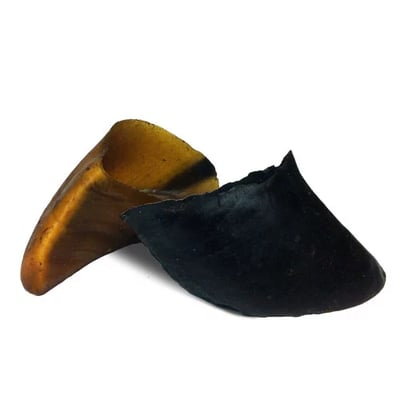 If you have a big chewer, beef hooves are durable, natural, long-lasting dog chews with another unique feature. With a natural cavity inside them, beef hooves can be stuffed with food, treats, or peanut butter for added enjoyment.
If you have a big chewer, beef hooves are durable, natural, long-lasting dog chews with another unique feature. With a natural cavity inside them, beef hooves can be stuffed with food, treats, or peanut butter for added enjoyment.
Hooves have a strong odour that dogs love, too. Even if you don't care for the smell, these are a fun and versatile option to encourage pickier pets to chew.
We Recommend: Eldon's Beef Hooves
9. Coffee Wood Chews
/Long%20Lasting%20Dog%20Chews%20to%20Keep%20Your%20Dog%20Busy/spot-coffee-wood-chew_4__1.webp?width=450&height=450&name=spot-coffee-wood-chew_4__1.webp)
Ok, we know this one might be extra confusing. Wood might be the last thing you'd want your dog to chew on, but it's surprisingly durable and calorie-free. It's also odour-free and won't stain, making it ideal for dogs that like to enjoy their chews indoors.
Unlike sticks and branches your dog finds outside, coffee wood is made from densely packed fibres, so although it's hard to the touch, it will soften as your dog chews, reducing the risk of splintering.
We Recommend: Spot Coffee Wood
10. Beef Strips
 Angus Strips are made from the beef esophagus. Our Angus Strips are sourced from grass-fed cows in Argentina and are always hormone and antibiotic-free! No smoke flavour or preservatives are added.
Angus Strips are made from the beef esophagus. Our Angus Strips are sourced from grass-fed cows in Argentina and are always hormone and antibiotic-free! No smoke flavour or preservatives are added.
The texture is similar to a crunchy jerky and is great for less aggressive chewers, puppies, and dogs that are missing a few teeth. The thin strips will soften as they are chewed, allowing your dog to safely eat and digest the esophagus strips.
We Recommend: Eldon’s Angus Beef Strips
11. Chomper Sticks
 Just like the Angus Strips, our Beef Chomper Sticks are made from the same Argentinian-sourced cattle. These sticks are a little tougher than the Angus Strips, but are still suitable for all breeds and sizes. The thinner shape also allows them to scrape against hard-to-reach teeth as they chew.
Just like the Angus Strips, our Beef Chomper Sticks are made from the same Argentinian-sourced cattle. These sticks are a little tougher than the Angus Strips, but are still suitable for all breeds and sizes. The thinner shape also allows them to scrape against hard-to-reach teeth as they chew.
Chompers are highly digestible, so you can feel good knowing that you are offering your pup a safe and tasty natural chew. They are available in two sizes, 6" and 12", so always choose the size that best suits your dog.
We Recommend: Eldon’s Beef Chomper Sticks
12. Patella Bones
/Long%20Lasting%20Dog%20Chews%20to%20Keep%20Your%20Dog%20Busy/beef_patella_600_600_px_.webp?width=350&height=350&name=beef_patella_600_600_px_.webp) Patella bones, or kneecaps, are one of our best-selling long-lasting natural dog treats, made of 100% beef kneecaps. These are composed mainly of beef cartilage and bone, which makes them beneficial to hip and joint health. They are sold raw or smoked, with raw being the safest options.
Patella bones, or kneecaps, are one of our best-selling long-lasting natural dog treats, made of 100% beef kneecaps. These are composed mainly of beef cartilage and bone, which makes them beneficial to hip and joint health. They are sold raw or smoked, with raw being the safest options.
Unlike many other recreational bones, kneecaps are less likely to splinter and are a safer alternative for tough chewers. They are smaller bones, so they may not be suitable for large and giant breeds. Always supervise your dog to prevent choking or swallowing larger chunks.
We Recommend: Big Country Raw Beef Patella Bones
13. Pig and Beef Ears
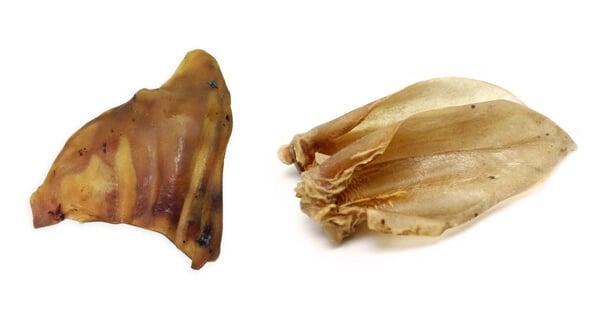 Dogs love the texture and taste of natural pig ears or cow ears, which makes them an easy guess for this top list. We offer different natural ear options to accommodate the needs of individual pets.
Dogs love the texture and taste of natural pig ears or cow ears, which makes them an easy guess for this top list. We offer different natural ear options to accommodate the needs of individual pets.
Our pig ears for dogs are made from North American ingredients right here in Canada, conveniently packed and priced with the best value in mind. Our Pig Ears are smoked, leaving them crunchy and irresistible to dogs.
Beef ears can be baked, dehydrated, or air-dried for a lower-calorie option. These chews are also a great dental care option, as they are thinner than pig ears and can work hard to reach places in your dog's mouth.
We Recommend: Noah's Ark Cow's Ears
14. Turkey Necks
 Edible Poultry bones are a great way to provide your dog with a fun, tasty, and nutritious chew. Not all poultry bones are safe. In fact, only raw poultry necks, feet, wing tips, and backs should be offered to dogs.
Edible Poultry bones are a great way to provide your dog with a fun, tasty, and nutritious chew. Not all poultry bones are safe. In fact, only raw poultry necks, feet, wing tips, and backs should be offered to dogs.
Turkey is one of the larger poultry options readily available in Canada, making it suitable for any size dog, and it can be offered frozen, fresh, dehydrated, or freeze-dried. These meaty bones are high in protein and calcium, making them an excellent chew option for growing, raw-fed puppies.
We Recommend: Vital Essentials Turkey Necks
15. Stuffed Beef Strips
 A favourite for picky pups, this stuffed treat blends a chewy, tough exterior with a soft crumbly meat filling. Angus stuffers are a beef and tapioca filling wrapped in a thin layer of the beef esophagus.
A favourite for picky pups, this stuffed treat blends a chewy, tough exterior with a soft crumbly meat filling. Angus stuffers are a beef and tapioca filling wrapped in a thin layer of the beef esophagus.
They don't last forever, but they are easy on the tummy and packed with flavour that no puppy can resist. They are only offered in one size, so they may not be suitable for every dog. Large dogs may be inclined to gulp the tasty treat, while extra-small breeds simply don’t need that many calories in one sitting.
We Recommend: Eldon's Beef Stuffers
16. Extruded Chew Sticks
/Long%20Lasting%20Dog%20Chews%20to%20Keep%20Your%20Dog%20Busy/etta-says-deluxe_chews.jpg?width=500&height=250&name=etta-says-deluxe_chews.jpg)
Choosing a meaty pressed treat stick can be a great option for light chewers. These dense sticks are uniquely extruded, similarly to kibble, to produce a hard, crunchy chew stick that is packed with flavour.
You'll find a variety of flavours and sizes to best meet the unique chewing needs of your pet, including picky eaters and those with allergies.
We Recommend: Etta Says Deluxe Chew Sticks
17. Dental Chews
/Long%20Lasting%20Dog%20Chews%20to%20Keep%20Your%20Dog%20Busy/whimzeees-dental-chews-gator.webp?width=400&height=367&name=whimzeees-dental-chews-gator.webp)
Considering one of the main benefits of natural chews for dogs is the dental benefits, it should be no surprise that long lasting dental chews would make the list. Dental chew sticks and treats can come in a variety of shapes and formulas, but all are designed to keep your dog chewing.
Though not the toughest chews on our list, these are a great option for puppies and smaller breeds who like to chew, but can't handle anything too big or too hard.
We Recommend: Whimzees Dental Chews
18. Bladder Sticks
 They may seem like an odd animal part to chew on, but bladder sticks are cooked, long sticks made of a cow’s bladder. They aren't the most pleasant-smelling chew either, so they are best fed outdoors, in kennels, or just away from people who can't handle the stink.
They may seem like an odd animal part to chew on, but bladder sticks are cooked, long sticks made of a cow’s bladder. They aren't the most pleasant-smelling chew either, so they are best fed outdoors, in kennels, or just away from people who can't handle the stink.
The bladder is made of muscle and connective tissues, similar to a tendon or ligament. They are firm when cooked and dried, but soften as your dog chews. Similar to a tendon, Bladder Sticks are great for dental care and provide a healthy dog chew source of collagen to your pet's diet.
We Recommend: Eldon’s Bladder Sticks
19. Cod Sticks
 Fish skins are an excellent chew for teething puppies. They are soft enough to be easily digested but chewy enough to give your puppy a gummy chewing experience. If you don’t mind the fishy scent (we know your puppy won’t!), then Icelandic+ Cod skins are a great option.
Fish skins are an excellent chew for teething puppies. They are soft enough to be easily digested but chewy enough to give your puppy a gummy chewing experience. If you don’t mind the fishy scent (we know your puppy won’t!), then Icelandic+ Cod skins are a great option.
Icelandic+ focuses on sustainability and environmental impact, so all of their products are free-range, grass-fed, or wild-caught from the clean landscapes and waters of Iceland.
We Recommend: Icelandic+ Cod Sticks
20. Himalayan Yak Cheese
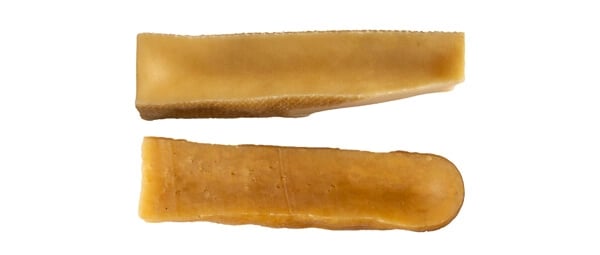
Yak cheese is a hard, natural product that many dogs find extremely tasty. Non-staining and odour-free, it makes an excellent natural chew choice for any dog. Low-fat and more digestible than rawhide, bones, or antlers, yak cheese is irresistible to most dogs.
As with any natural chew, always monitor your pet with it and remove it if the chew is small enough that your pet can swallow it whole. Also, watch how much yak cheese you give your dog. While yak cheese is low in fat, it is high in calories.
If the yak cheese chew gets too small for your pet to safely chew on, you can microwave it on high power for 45 – 75 seconds, let it cool for 2 minutes and give it to your dog as a crunchy, puffy cheese treat.
We Recommend: Himalayan Yak Chews
21. Duck Feet
/Long%20Lasting%20Dog%20Chews%20to%20Keep%20Your%20Dog%20Busy/valuepack-duck-feet.webp?width=350&height=350&name=valuepack-duck-feet.webp)
Give your dog a satisfying crunch with a tasty dehydrated duck foot. This natural chew may not be that big, but it works as a great chew for small-breed dogs. They can eat the whole thing without offering too many calories. Plus, it's gentler on the teeth compared to more robust chews.
Though poultry bones may seem scary, feet are among the only safe and completely edible options for dogs. Necks, backs, and wing tips can also be fed raw or dehydrated. They are rich in calcium, and dogs love the taste.
We Recommend: ValuePack Duck Feet
22. Beef Trachea
/Long%20Lasting%20Dog%20Chews%20to%20Keep%20Your%20Dog%20Busy/asado-beef-trachea.webp?width=350&height=350&name=asado-beef-trachea.webp) Cartilage is very nutritious for dogs, which is why beef trachea makes our list of best long-lasting chews for dogs. Not only is it flavourful and nutritious, but it has a chewy crunch that dogs go crazy for.
Cartilage is very nutritious for dogs, which is why beef trachea makes our list of best long-lasting chews for dogs. Not only is it flavourful and nutritious, but it has a chewy crunch that dogs go crazy for.
This type of chew is suited for small to medium-sized dogs and moderate chewers. Trachea is high in protein and is a natural source of glucosamine, chondroitin, and collagen, which help support hip and joint health for dogs at all life stages. It's also low in fat, so this makes a great chew for pudgy dogs and dogs with sensitive tummies.
We Recommend: Silver Spur ASADO Beef Trachea
23. Rubber Chew Toys
 For dogs who love to chew all day, a chew that cannot be consumed makes sense for their health and their weight. Well-made rubber chew toy also tends to last a lot longer than most consumable chews and are still a reasonable price. If you buy a good-quality rubber chew, your dog will likely get the most chew for your money.
For dogs who love to chew all day, a chew that cannot be consumed makes sense for their health and their weight. Well-made rubber chew toy also tends to last a lot longer than most consumable chews and are still a reasonable price. If you buy a good-quality rubber chew, your dog will likely get the most chew for your money.
We Recommend: KONG Extreme
24. Nylon Chew Toys
/Long%20Lasting%20Dog%20Chews%20to%20Keep%20Your%20Dog%20Busy/benebone-zaggler-bacon.webp?width=350&height=292&name=benebone-zaggler-bacon.webp) Nylon chews are an excellent, long-lasting dog chew choice as they are very durable. Nylon chews often come in different textures and shapes, and with special flavours to interest your dog. They can even help clean your dog's teeth. Flavoured nylon bones make good chews for overweight dogs.
Nylon chews are an excellent, long-lasting dog chew choice as they are very durable. Nylon chews often come in different textures and shapes, and with special flavours to interest your dog. They can even help clean your dog's teeth. Flavoured nylon bones make good chews for overweight dogs.
Scented, yummy-tasting varieties retain your dog's interest longer than plain nylon. Tasty Bone infuses natural flavours throughout the entire chew toy, unlike most brands that just coat the nylon toy. This will retain your dog's interest for longer.
Like any chew toy, they are not edible. A very small piece can be swallowed and passed safely for most dogs, but these toys should never be consumed. Never leave your dog unattended with a nylon chew, and inspect the chew toy regularly for damage.
We Recommend: Benebone
25. Rope Chews
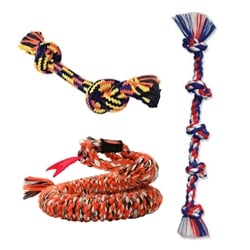 An inexpensive and universally loved chew toy is the rope toy. These teething toys consist of cotton ropes generally braided into a bone shape.
An inexpensive and universally loved chew toy is the rope toy. These teething toys consist of cotton ropes generally braided into a bone shape.
For a natural chew, look for 100% cotton fibres. As your dog's teeth rub on the fibres, plaque and bacteria that cause bad breath and gum inflammation are removed to freshen your dog's breath– just like “flossing” your dog's teeth. Dogs love chewing rope toys, but they'll love it when you play tug-of-war even more.
For teething puppy chews, rope toys can be soaked and frozen to help relieve some of the pain and discomfort from their teeth moving. This can, of course, get messy, so this is a great option for when your dog is in their kennel, outside, or on an easy-to-clean your dog's surface.
Thread from rope toys can shed as they chew. The small fibres won't harm your pet, but do your best to avoid letting your dog eat the rope toy, which can be very dangerous. Never leave your dog unattended with a rope toy, and be prepared to take it away if your dog tries to eat it.
We Recommend: Mammoth Flossy Toys
10 Things You Should Never Let Your Dog Chew

Dogs that love to chew often don't have much in the way of standards when it comes to the things they chew on. This means they might be inclined to chew on things that could be harmful to them.
Many of these dangerous “chews” can often be found in your house, your yard, and at the park. Be aware of the dangers around you and keep a close eye on your dog and the things he puts in his mouth.
You know your dog better than anyone, so scan your environment to remove threats and keep your dog close to avoid the temptation of picking up objects that could be harmful
Here are 10 dangerous things that dogs love to chew but really shouldn’t:
1. Sticks
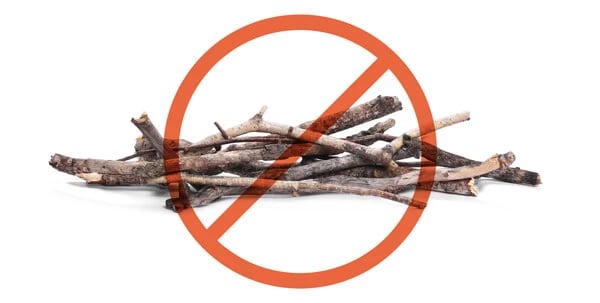 This is a tough one because sticks can be found anywhere that there is grass and trees. Whether your dog is patrolling the yard or investigating a bush on your daily walk, your dog is likely to come across sticks, twigs, and branches that are lying around.
This is a tough one because sticks can be found anywhere that there is grass and trees. Whether your dog is patrolling the yard or investigating a bush on your daily walk, your dog is likely to come across sticks, twigs, and branches that are lying around.
For some, it’s a fun toy; for others, it could be a tasty snack, but both can pose a serious threat if you are not careful. The risk of dry, splintered wood puncturing or cutting your dog’s mouth is high.
Deadwood becomes dry and brittle, so any dog crunching on it is likely to break off small, sharp spears that can damage their gums or, worse, their esophagus, stomach, or intestines.
Instead of sticks, offer your dog a Coffee Wood Chews. These natural chews will have a similar mouth feel, but will be safer the dry sticks from the park that have a high chance of splintering.
Even in a game of fetch, a stick caught the wrong way can get lodged in the mouth, break teeth, or damage eyes if they fumble the catch badly enough. Of course, you can’t account for every freak accident, but you can choose safer fetch toys like tennis balls or frisbees.
2. Rocks
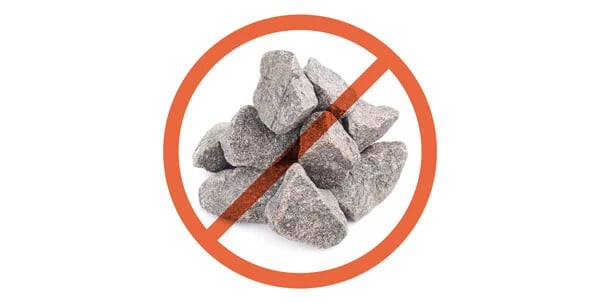 It’s easy for a dog to think of a rock as a fun chew or toy. They see us skipping them across ponds and casually kicking them as we walk. It’s a game for us, and they do as we do.
It’s easy for a dog to think of a rock as a fun chew or toy. They see us skipping them across ponds and casually kicking them as we walk. It’s a game for us, and they do as we do.
For dogs that play with rocks, especially those that chew them, their dental health is at risk. Rocks of any size can break or crack their teeth, causing your dog severe pain and sticking you with a hefty vet bill.
If swallowed, larger rocks can be a choking hazard or potential blockage. Even smaller rocks can build up to create obstructions in the intestines or damage the soft tissues of the digestive tract.
Instead of rocks, give your dog some Yak Cheese. These tasty chews will have a satisfying hard crunch with significantly less risk to your dogs dental health.
If you suspect that your dog has swallowed rocks, contact your vet immediately. The rocks may pass, but you need to know what to look for over the next 48 hours.
3. Cooked Bones
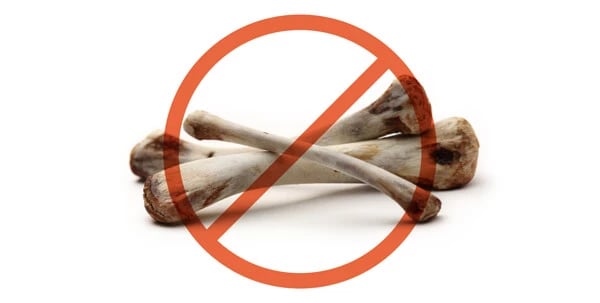 This is a controversial subject because cooked bones are often sold in pet stores and can have some dental benefits for a dog that is lucky enough not to suffer the consequences.
This is a controversial subject because cooked bones are often sold in pet stores and can have some dental benefits for a dog that is lucky enough not to suffer the consequences.
While chewing is vital to your dog's dental health, cooked bones get brittle and hard. This could lead to cracked or damaged teeth. The bone can easily splinter, creating sharp pieces that can cut your dog’s gums.
Pieces that are swallowed could cause blockages or puncture the stomach or intestines. While this doesn’t happen to every dog, the risk is very real, so use caution when feeding any type of cooked bone.
Raw Bones are a safer alternative to cooked or smoked bones. Though they are still a long lasting dog chew, raw bones have much less risk of splintering.
Some dogs have been eating cooked bones for years with no problems, and I’d say they are lucky. If you do choose to feed cooked bones, I recommend monitoring your dog at all times. You may be able to prevent a disaster if you are able to take away a bone or a piece of a bone that looks dangerous.
4. Plastic Bottles
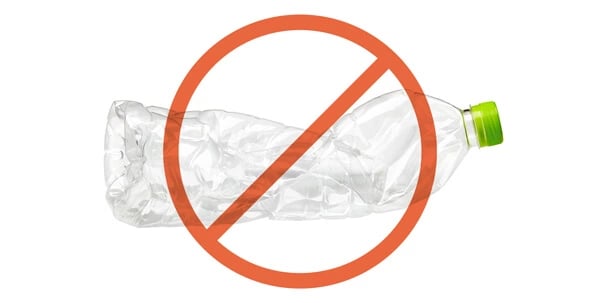 Maybe it’s the sound or the texture, but dogs go nuts for an empty plastic bottle. Chewing them is both engaging and satisfying for your dog when they feel the crunch of the bottle. For prey-driven dogs, it could even feel similar to the feeling of crunching down on fresh prey.
Maybe it’s the sound or the texture, but dogs go nuts for an empty plastic bottle. Chewing them is both engaging and satisfying for your dog when they feel the crunch of the bottle. For prey-driven dogs, it could even feel similar to the feeling of crunching down on fresh prey.
It’s quite common to use plastic bottles as part of a DIY toy or treat dispenser. As long as they are not chewing the bottle with the intent to destroy it, then using them in this way is safe.
If your dog is an aggressive chewer, then using a tougher toy meant to withstand its bite will be safer.
Plastic is not edible, and as your dog chews it, sharp pieces and ridges can form and could cut your dog’s mouth and irritate its esophagus. Thin plastic bottles are easy enough to destroy, so breaking off larger chunks can lead to choking or blockages.
Dogs that love chewing plastic will likely enjoy a durable dog chew toy. Try to find toys that are tough enough that your dog can't destroy them, and always supervise your dog's chewing sessions.
Make sure that your recycling is safely stored away from your dog. If your recycling bin is within reach, your dog will likely be seduced into sneaking a quick chomp of the makeshift toy.
5. Ice Treats
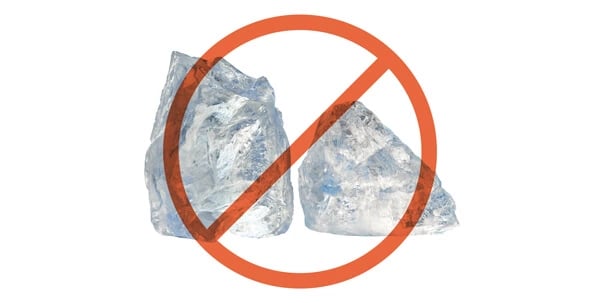 Most dogs enjoy an occasional ice cube. We’ve all dropped a cube or two when trying to free them from the tray and quickly called Fido over to clean up our mess. A single small ice cube is unlikely to do any harm, but larger blocks of ice are too hard and can damage their teeth.
Most dogs enjoy an occasional ice cube. We’ve all dropped a cube or two when trying to free them from the tray and quickly called Fido over to clean up our mess. A single small ice cube is unlikely to do any harm, but larger blocks of ice are too hard and can damage their teeth.
Puppies, seniors, and dogs with dental issues who are looking for a cold, safe dog chew should avoid chewing on ice. The risk to their teeth is even greater.
If your dog is an ice cube fiend or you want to help cool them down in the summer, try freezing shallow ice cubes or using a pet-safe treat mould. They will be easier to chew and will melt quickly in their mouth.
Freezing ice inside a rubber toy is another great way to offer a refreshing treat. The toy itself provides a protective barrier, and the ice will begin to melt into smaller pieces before they can get it out.
For dogs that love a frozen treat, try one of our favourite frozen dog treat recipes. These chilled snacks will keep your dog cool and will satisfy his icy cravings. Plus you can load your frozen dogsicles up with tons of nutritious ingredients.
6. Furniture
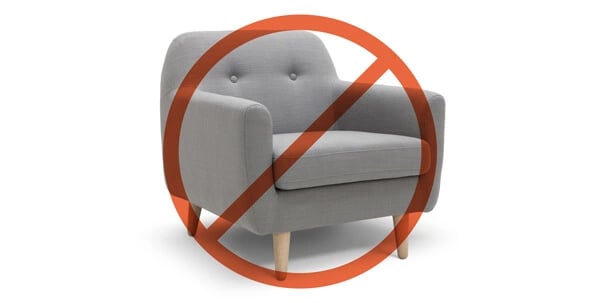 Not everything on our list is something that you want them to consider a chew toy. Destructive chewing, like on your furniture, is a common sign of anxiety, boredom, or frustration in dogs.
Not everything on our list is something that you want them to consider a chew toy. Destructive chewing, like on your furniture, is a common sign of anxiety, boredom, or frustration in dogs.
The materials in your furniture can be toxic if swallowed, so make sure that you quickly break this habit to keep your dog safe.
Couches and other fabrics may look like a really big stuffed toy to your dog, but the stuffing, foam, and fabrics inside are dangerous. They can lead to intestinal blockages, constipation, or choking. Beyond that, you have no idea if the fabrics have been treated with flame-retardant chemicals or other substances that can be toxic if your pet ingests them.
Wood furniture, like tables, chairs, and even baseboards, may be another target for a puppy throwing a tantrum. These are not only a splintering risk but are typically finished with a stain, varnish, or paint that could be toxic to your dog.
When your dog nibbles on the couch, offer a fun Plush Dog Toy instead. They can be pulled out quickly to distract and redirect your dog's destructive behaviours.
If your dog has this unhealthy anxiety habit, then you should look into ways to calm anxiety, distract them, or consider kennel training your dog when they are unsupervised.
7. Metal
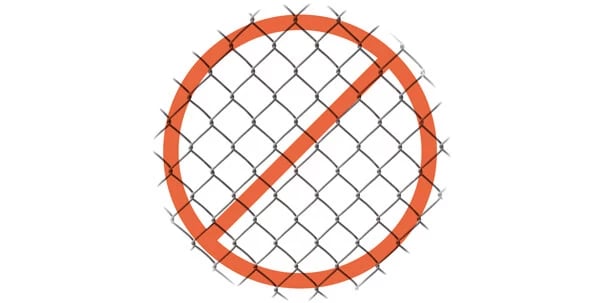 Another nasty habit of anxiety-ridden dogs is chewing on fences, crates, and whatever else they feel is keeping them captive. While metal is less likely to break off and be ingested, the real risk is the damage to their mouth.
Another nasty habit of anxiety-ridden dogs is chewing on fences, crates, and whatever else they feel is keeping them captive. While metal is less likely to break off and be ingested, the real risk is the damage to their mouth.
Chain link fences, chicken wire fencing, and the bars of a crate or kennel may get chewed if your dog is anxious about being confined. They are likely to break teeth, wear away protective enamel, and irritate their gums to the point of bleeding.
They may even bend or break bars or links in an attempt to escape. This raises the potential for severe cuts and injury. In cases of extreme anxiety, it’s a good idea to talk to a professional trainer who can equip you with the tools and methods to ease your dog’s stress.
Your dog needs a distraction; try a Beef Trachea to occupy him. Offering him a safe and edible natural chew can offer a safe and fun distraction during downtime.
8. Cardboard
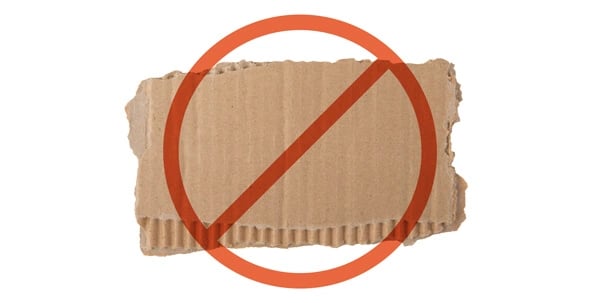 Another DIY toy material, cardboard, can be fun to play with and tempting to eat. Most cardboard is non-toxic, but that doesn’t mean there is no risk. Small pieces are ingested and will stick to each other when damp. It can accumulate into a thick, gooey mass in your dog’s stomach, which may be too big or dense to break apart. Life-threatening intestinal blockages are possible.
Another DIY toy material, cardboard, can be fun to play with and tempting to eat. Most cardboard is non-toxic, but that doesn’t mean there is no risk. Small pieces are ingested and will stick to each other when damp. It can accumulate into a thick, gooey mass in your dog’s stomach, which may be too big or dense to break apart. Life-threatening intestinal blockages are possible.
If your dog has ingested cardboard, keep an eye out for symptoms like vomiting, diarrhea, constipation, and lethargy. Also, monitor bowel movements to make sure that the cardboard is passed correctly over the next day or two.
Replace that cardboard with an Angus Strip. These thin chews will be much more appetizing than plain old cardboard and are a great chew for helping break this unsafe habit.
9. String, Ribbons, and Wire
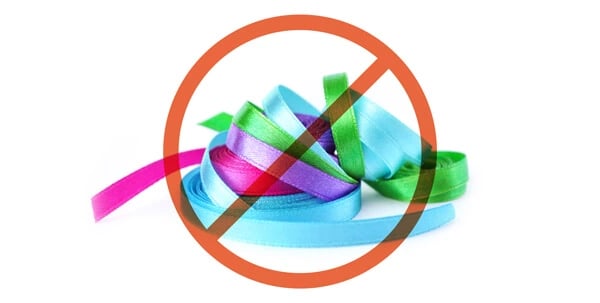 Pretty much anything string-like could be risky. Decorations from holidays and parties, string from meat packaging, and even dental floss could be a significant risk to a curious dog.
Pretty much anything string-like could be risky. Decorations from holidays and parties, string from meat packaging, and even dental floss could be a significant risk to a curious dog.
The biggest risk is that the string can become tangled in the digestive tract, causing a blockage, constricting blood flow, and damaging sensitive tissues in the digestive system.
If it’s floss your dog is craving, then give him a Beef Tendon. These chews soften as they chew and slide between the teeth pulling out bacteria and food debris that contribute to bad dog breath.
If you ever see a string hanging from your dog’s mouth that has been partially swallowed or peeking out of your dog’s behind, do not pull it out. It could be stuck on something.
Trying to force it can do more damage than good. Instead, call your vet immediately. They will advise you as to whether it is safe to remove.
10. Shoes
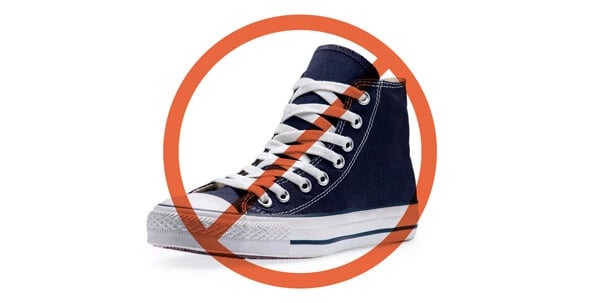 It may be the oldest stereotype in the book, but chewing on shoes is a typical puppy habit, and most of us have plenty of anecdotal evidence to back this up. While this annoying and destructive habit can be infuriating, we also need to consider how dangerous it is for our pets.
It may be the oldest stereotype in the book, but chewing on shoes is a typical puppy habit, and most of us have plenty of anecdotal evidence to back this up. While this annoying and destructive habit can be infuriating, we also need to consider how dangerous it is for our pets.
Many of the materials used in shoes can be a hazard for a curious pup. The dye and materials could be toxic if ingested. As we went over in the previous section, letting your dog chew on a shoestring could be a choking or ingestion hazard.
Bully Sticks are a great treat to make your dog forget about your shoes. They will last much longer and taste way better.
Any of us would be devastated if our favourite pair of kicks got demolished, but the biggest offenders are often the cheapest: flip-flops. Everyone has a pair, or seven, of cheap, foamy flip-flops that get tossed in the car for road trips and visits to the lake. The material of these shoes is a particularly appealing texture to dogs.
They are easy to destroy, but the pieces that are swallowed are not going to be digested easily. In fact, it might not digest at all. Intestinal blockages are more likely with spongy materials like these.
Keep shoes, no matter how replaceable, out of reach.
Choose Safety Over Fun
When looking for the best long lasting chews, it's easy to get swept up in the benefits of the chew. Some chews will last a really long time. Some are highly nutritious. But not all chews are safe for every dog.
You should always weigh the pros and cons of the chew, how your dog chews, and in what circumstances the chew will be given. Even the safest long-lasting dog chews can be dangerous if your dog is chewing them in a way that is unsafe.
You may be looking for the longest-lasting chew to give your dog hours of chew time, but the denser and sturdier the chew, the higher the risk of tooth damage, splintering, and digestive issues.
Always monitor your dog with any chew to prevent the risk of choking or digestive emergencies. It's always better to be safe than sorry.
Long-Lasting Dog Chews FAQs
What makes a dog chew "long-lasting"?
Long-lasting dog chews are made from dense, durable ingredients that take longer to break down than traditional treats, encouraging steady chewing rather than quick consumption. They’re designed to keep dogs occupied, satisfy natural chewing instincts, and provide enrichment between meals or activities.
What are the most popular types of long-lasting dog chews?
Some of the most common types of long-lasting dog chews include bully sticks, raw bones, antlers, yak chews, and dental-style chews. Each type offers a different texture, digestibility, and density, so you can choose the one that suits your dog's chewing style.
Are long-lasting dog chews safe for all dogs?
While long-lasting chews are generally safe for most dogs, you need to consider your dog's individual health and habits. No chew is 100% safe, so you should always supervise your dog when chewing to prevent choking or unsafe ingestion. Also consider things like digestibility and allergies when choosing the long-lasting chew.
How can I choose the right long-lasting chew for my dog?
Consider your dog's size, age, and chewing habits when selecting a chew. The hardest chews aren't always the safest, especially for young puppies and seniors with delicate teeth. It's always important to choose a style that is digestible and appropriately sized so they can't be swallowed whole or choked on.
Can long-lasting chews help with dental health?
Chewing in general is considered beneficial for dental health, which is why many long-lasting chews can help to promote dental health by reducing plaque and tartar buildup as your dog chews. Some chews are better than others, especially those that allow your dog's teeth to sink in a little, like bully sticks, pig ears, and tendons.
Are there any safety tips for giving my dog long-lasting chews?
Always supervise your pet while chewing and remove small or broken pieces to prevent choking hazards. If your dog has a history of digestive issues, consult your veterinarian before introducing new chews into their diet.
.png?width=200&height=66&name=logo%20(1).png)




.webp?width=800&height=533&name=woman-washing-hands(1).webp)



.jpg)
